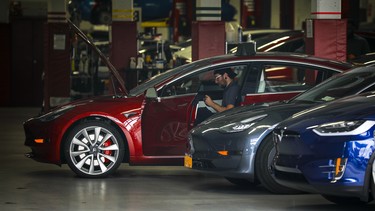Article content Is Tesla falsifying its vehicles’ mileage to duck warranty claims? The California owner of a 2020 Model Y believes so, and is officially calling foul by filing a class-action lawsuit against the electric-vehicle company. The lawsuit alleges Tesla cars don’t use traditional methods in calculating odometer readings, mechanical or electronic, but instead suggests Tesla relies on “predictive algorithms, energy consumption metrics, and driver behavior multipliers that manipulate and misrepresent the actual mileage travelled.” The lawsuit – filed by Sacramento firm Singleton Schreiber LLP on behalf of Tesla owner Nyree Hinton – alleges the reason Tesla inflates its mileage is so customers’ vehicles reach their warranty limits and lease obligations sooner, saving the company money in warranty repairs.
Hinton even says in independently tracking his own Model Y’s mileage, he found that the odometer began reading a lot more accurately again as soon as he crossed the warranty threshold. To get into the details, Hinton says his Model Y clocked an average of 55.54 miles (89.

4 km) per day from December 14, 2022, to February 6, 2023, which roughly lined up with his daily commute. But rather suddenly, between March 26, 2023 and June 28, 2023, the average jumped to 72.53 miles (116.
7 km) per day, just as the vehicle neared its warranty expiration, despite him not at all breaking from his previous routine. Hinton bought the Model Y in December 2022 with 36,772 miles (59,178 km) on it. Hinton also compared his Model Y’s mileage to that of previous vehicles he’s owned (two Chevrolets and a Mercedes-Benz model, says the suit).
The average distance covered by those three vehicles under six months each of Hinton’s ownership was 6,086 miles (9,794 km); the Model Y logged 13,228 miles (21,288 km) in the same period, despite being off the road for extended periods for repairs. Hinton uses these numbers to allege the odo may be off by up to 117%. When is an odometer reading not an odometer reading? When you take into account that Tesla allegedly admits that while it can simply use hyper-accurate GPS readings to clock miles, it also employs a patented “‘miles-to-electrical energy conversion factor’ that varies dynamically based on road and traffic conditions,” says the lawsuit.
It’s easy to dismiss this particular case as some anomalous lemon. But automotive outlets across the web have noted there have been plenty of similar complaints cropping up on Tesla owner forums, as well as reddit , for the past two years, reporting the same kind of discrepancies. Hinton seems quite obviously frustrated with his Model Y purchase, but if it’s any silver lining, he’s probably not alone.
A new guerrilla advertising campaign launched just as we were putting this story to press is reaching out to Cybertruck, Model 3, and Model Y owners who may be experiencing “Tesla Regret Syndrome.” The campaign ties a cheeky website to a tongue-in-cheek (or maybe not?) two-minute ad put together by a group of Seattle filmmakers. It seems the people behind it are linked to the growing Tesla Takedown movement , and presume to unite owners unable to offload a purchase they now regret in an effort to instead warn others, or at least to get them some bumper stickers declaring their irritation.
If Tesla is indeed fiddling with odometer readings to duck warranty work, that might just be the sour icing on a stale cake for those folks. Sign up for our newsletter Blind-Spot Monitor and follow our social channels on X , Tiktok and LinkedIn to stay up to date on the latest automotive news, reviews, car culture, and vehicle shopping advice..
Technology

Lawsuit alleges Tesla inflated mileage to deny warranty claims

A California class-action says that the odometers on some Tesla models may be overstating miles covered by more than 100%















